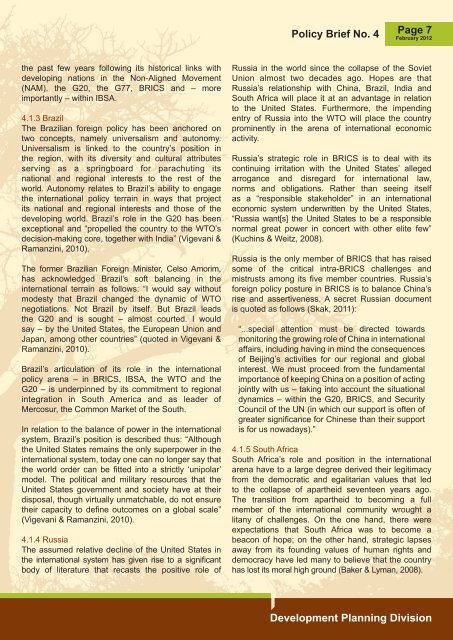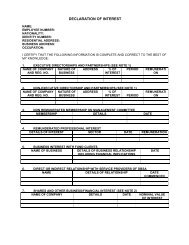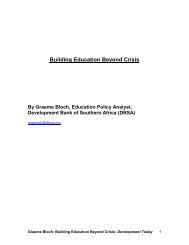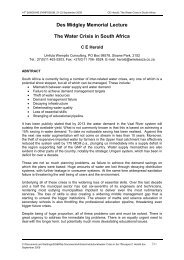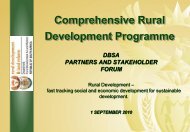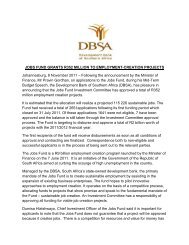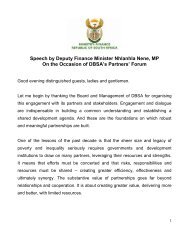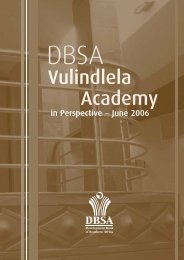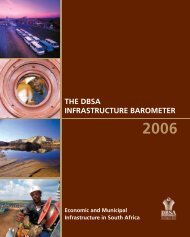South Africa's national interest and BRICS
South Africa's national interest and BRICS
South Africa's national interest and BRICS
Create successful ePaper yourself
Turn your PDF publications into a flip-book with our unique Google optimized e-Paper software.
Policy Brief No. 4 Page 7February 2012the past few years following its historical links withdeveloping nations in the Non-Aligned Movement(NAM), the G20, the G77, <strong>BRICS</strong> <strong>and</strong> – moreimportantly – within IBSA.4.1.3 BrazilThe Brazilian foreign policy has been anchored ontwo concepts, namely universalism <strong>and</strong> autonomy.Universalism is linked to the country’s position inthe region, with its diversity <strong>and</strong> cultural attributesserving as a springboard for parachuting its<strong>national</strong> <strong>and</strong> regional <strong>interest</strong>s to the rest of theworld. Autonomy relates to Brazil’s ability to engagethe inter<strong>national</strong> policy terrain in ways that projectits <strong>national</strong> <strong>and</strong> regional <strong>interest</strong>s <strong>and</strong> those of thedeveloping world. Brazil’s role in the G20 has beenexceptional <strong>and</strong> “propelled the country to the WTO’sdecision-making core, together with India” (Vigevani &Ramanzini, 2010).The former Brazilian Foreign Minister, Celso Amorim,has acknowledged Brazil’s soft balancing in theinter<strong>national</strong> terrain as follows: “I would say withoutmodesty that Brazil changed the dynamic of WTOnegotiations. Not Brazil by itself. But Brazil leadsthe G20 <strong>and</strong> is sought – almost courted. I wouldsay – by the United States, the European Union <strong>and</strong>Japan, among other countries” (quoted in Vigevani &Ramanzini, 2010).Brazil’s articulation of its role in the inter<strong>national</strong>policy arena – in <strong>BRICS</strong>, IBSA, the WTO <strong>and</strong> theG20 – is underpinned by its commitment to regionalintegration in <strong>South</strong> America <strong>and</strong> as leader ofMercosur, the Common Market of the <strong>South</strong>.In relation to the balance of power in the inter<strong>national</strong>system, Brazil’s position is described thus: “Althoughthe United States remains the only superpower in theinter<strong>national</strong> system, today one can no longer say thatthe world order can be fi tted into a strictly ‘unipolar’model. The political <strong>and</strong> military resources that theUnited States government <strong>and</strong> society have at theirdisposal, though virtually unmatchable, do not ensuretheir capacity to defi ne outcomes on a global scale”(Vigevani & Ramanzini, 2010).4.1.4 RussiaThe assumed relative decline of the United States inthe inter<strong>national</strong> system has given rise to a significantbody of literature that recasts the positive role ofRussia in the world since the collapse of the SovietUnion almost two decades ago. Hopes are thatRussia’s relationship with China, Brazil, India <strong>and</strong><strong>South</strong> Africa will place it at an advantage in relationto the United States. Furthermore, the impendingentry of Russia into the WTO will place the countryprominently in the arena of inter<strong>national</strong> economicactivity.Russia’s strategic role in <strong>BRICS</strong> is to deal with itscontinuing irritation with the United States’ allegedarrogance <strong>and</strong> disregard for inter<strong>national</strong> law,norms <strong>and</strong> obligations. Rather than seeing itselfas a “responsible stakeholder” in an inter<strong>national</strong>economic system underwritten by the United States,“Russia want[s] the United States to be a responsiblenormal great power in concert with other elite few”(Kuchins & Weitz, 2008).Russia is the only member of <strong>BRICS</strong> that has raisedsome of the critical intra-<strong>BRICS</strong> challenges <strong>and</strong>mistrusts among its fi ve member countries. Russia’sforeign policy posture in <strong>BRICS</strong> is to balance China’srise <strong>and</strong> assertiveness. A secret Russian documentis quoted as follows (Skak, 2011):“...special attention must be directed towardsmonitoring the growing role of China in inter<strong>national</strong>affairs, including having in mind the consequencesof Beijing’s activities for our regional <strong>and</strong> global<strong>interest</strong>. We must proceed from the fundamentalimportance of keeping China on a position of actingjointly with us – taking into account the situationaldynamics – within the G20, <strong>BRICS</strong>, <strong>and</strong> SecurityCouncil of the UN (in which our support is often ofgreater signifi cance for Chinese than their supportis for us nowadays).”4.1.5 <strong>South</strong> Africa<strong>South</strong> Africa’s role <strong>and</strong> position in the inter<strong>national</strong>arena have to a large degree derived their legitimacyfrom the democratic <strong>and</strong> egalitarian values that ledto the collapse of apartheid seventeen years ago.The transition from apartheid to becoming a fullmember of the inter<strong>national</strong> community wrought alitany of challenges. On the one h<strong>and</strong>, there wereexpectations that <strong>South</strong> Africa was to become abeacon of hope; on the other h<strong>and</strong>, strategic lapsesaway from its founding values of human rights <strong>and</strong>democracy have led many to believe that the countryhas lost its moral high ground (Baker & Lyman, 2008).Development Planning Division


